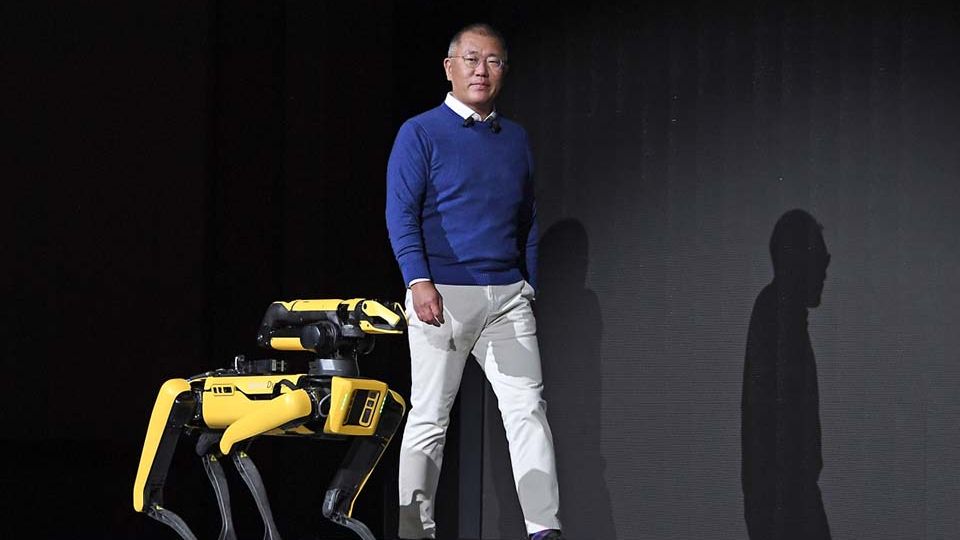April 8, 2024
SEOUL – Hyundai Motor Group has found itself at a crossroads as Boston Dynamics, a US-based robotics company that the Korean auto conglomerate acquired in 2021, struggles to find a breakthrough amid mounting losses.
Over two years have passed since Hyundai Motor Group Executive Chair Chung Euisun appeared on stage with Boston Dynamics’ four-legged, dog-like robot, Spot, at the CES 2022 in Las Vegas.
“Robots are getting closer to humans. Just like you are carrying your phone today, in the future, people will carry a Spot one day,” he had said at the time.
Despite the Hyundai Motor chief’s confidence in the future of robotics, most people do not own a Spot yet. According to Boston Dynamics, there were more than 1,000 Spots operating in 35 countries as of 2022. The price of a Spot is estimated at $75,000.
It is only logical to assume that Chung had probably been talking about a far-off future, but he and the auto conglomerate will have to make some difficult decisions sooner rather than later as the due date for Boston Dynamics’ initial public offering is only 14 months away.
Losses mount; IPO deadline approaches
According to the business reports of Hyundai Motor Company, Hyundai Mobis and Hyundai Glovis on Friday, Boston Dynamics turned a net loss of 335 billion won ($248 million) last year. The Massachusetts-headquartered robotics company recorded net losses of 255 billion won in 2022 and 197 billion won in 2021.
When Hyundai Motor Group acquired an 80 percent stake in Boston Dynamics from Japanese IT giant Softbank Group in June 2021, Hyundai Motor Company, Hyundai Mobis and Hyundai Glovis contributed 374 billion won, 249 billion won and 125 billion won, respectively, to buy out a 30 percent, a 20 percent and a 10 percent stake in the firm.
Hyundai Motor Group Executive Chair Chung bought in the last 20 percent as he contributed 249 billion won from his own pocket to complete the acquisition of the 80 percent stake.
The deal between the Korean and Japanese firms had a put option that requires Boston Dynamics to go public by June next year, giving Softbank a chance to sell off its remaining 20 percent stake. If the robotics firm is not listed by then, Hyundai Motor will have to buy out the remaining 20 percent stake from Softbank by June 2026.
“In theory, the two companies can revise the agreement so that the IPO deadline is pushed back to give more time so both parties can make the best of the IPO,” said an analyst working in the investment bank sector.
“IPO talks may have begun under the table but I have not heard about Hyundai Motor seeking consultation or approaching underwriters.”
The analyst added that pushing for an IPO right now to meet the deadline will not help Hyundai Motor as Boston Dynamics currently does not offer enough upside for investors.
Uncertain outlook
Industry watchers say that the Boston Dynamics acquisition is a must-succeed mission for Hyundai Motor Group, not only because Chung’s own money has been invested in it but also because it was the first major takeover since he took the top leadership position of the auto conglomerate in October 2020.
Boston Dynamics’ two commercialized robots are Spot and Stretch, a mobile robot with a hydraulic robot arm used for warehouse duties. But questions have been raised about the outlook of these two products as competition gets heated.
“When Spot made its public debut in 2015, people were hyped about Boston Dynamics’ level of technology,” said an engineering professor who wished not to be named.
“It’s been almost a decade and now we have similar four-legged robots. How much more advanced is Spot compared to its lookalike rivals such as Ghost Robotics?”
In December, Korean defense firm LIG Nex1 announced its plan to acquire a 60 percent stake in US quadruped robot developer Ghost Robotics for $240 million, which is cheaper than what Hyundai Motor had to pay for Boston Dynamics.
Although it is difficult to directly compare the two companies’ levels of technology from an outside perspective, the ongoing legal disputes between them show that they are trying to keep each other in check.
Boston Dynamics sued Ghost Robotics last year for allegedly infringing on several patents. Later, the latter sued the former for copying its robot dog design.
According to a Daishin Securities report on Boston Dynamics, it will take some time for the robotics company to secure price competitiveness through economies of scale.
“It’s true that (Boston Dynamics) lacks visibility to discuss business and profitability at the moment,” the report said.
“But we should focus on securing original technology and the possibility of creating synergy in regard to Hyundai Motor Group’s manufacturing and smart factories.”


